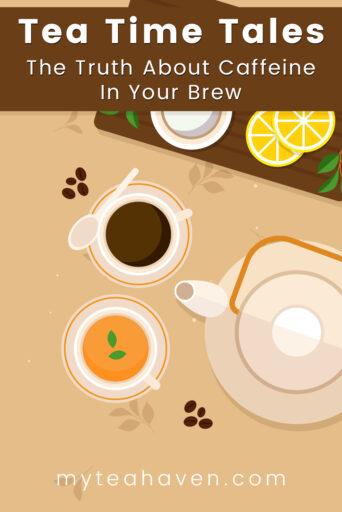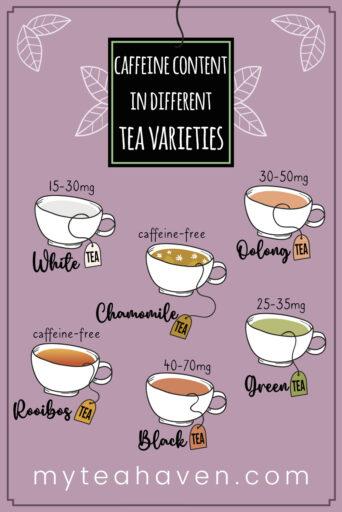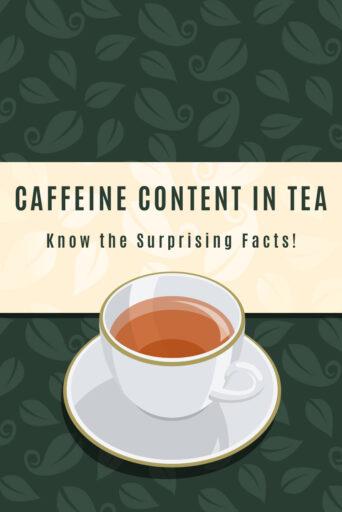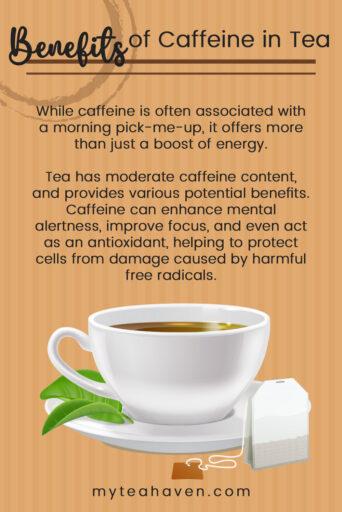Tea Time Tales: The Truth About Caffeine in Your Brew
Does Tea Have Caffeine?
Sitting with a delicious cuppa, you may have found yourself wondering: does tea have caffeine in it? And if so, how much? How does it compare to coffee? Today we’re going to learn more about the caffeine content in different types of tea and how it compares to coffee. I will also provide a few helpful suggestions for those looking for a more caffeine-free experience!
We are a participant in the Amazon Services LLC Associates Program, an affiliate advertising program designed to provide a means for us to earn fees by linking to Amazon.com and related sites. This post may contain affiliate links which means we may receive a commission, at no cost to you, for purchases made using our links. Please see my disclosure to learn more. Unless otherwise stated, all prices are in US$.
So, Does It Have Caffeine?
Yes, tea does have caffeine in it. However, the amount can vary depending on the type and how it is prepared. While it is generally lower than the caffeine levels in coffee, it is still present and can have stimulating effects.
What is Caffeine?

Caffeine is a natural stimulant that belongs to a group of compounds called methylxanthines.
It acts on the central nervous system to improve alertness, concentration, and overall cognitive performance.
Caffeine is commonly associated with coffee, but it is also present in various other beverages and foods, including tea.
Types of Tea
Tea comes in several enticing varieties. The most common types of tea include green, black, white, oolong, and herbal teas.
The processing methods and oxidation levels differ for each of these types, resulting in unique tastes and caffeine levels.

Caffeine Content in Different Tea Varieties
To understand the caffeine levels in various teas, let’s compare their approximate values per 8-ounce (240ml) serving:
- Green Tea: 25-35 mg
- Black Tea: 40-70 mg
- White Tea: 15-30 mg
- Oolong Tea: 30-50 mg
- Herbal Tea: Caffeine-free
Please keep in mind that these values are only estimates, as factors such as brewing time, water temperature, and leaf quality can also influence their caffeine levels.
Factors Affecting Caffeine Content
The caffeine content is influenced by several factors. For instance, brewing time plays a role, as longer steeping times tend to extract more caffeine.
Using hotter water can also result in higher caffeine levels. the quality of the leaves can further impact the overall caffeine content, with younger leaves generally containing more caffeine than mature leaves.
Benefits of Caffeine in Tea
While caffeine is often associated with a morning pick-me-up, it offers more than just a boost of energy.
Tea has moderate caffeine content, and provides various potential benefits. Caffeine can enhance mental alertness, improve focus, and even act as an antioxidant, helping to protect cells from damage caused by harmful free radicals.
Side Effects of Caffeine
Moderate caffeine consumption is generally considered to be safe for most individuals, but excessive intake can lead to unwanted side effects.
These side effects may include sleep disturbances, increased heart rate, nervousness, anxiety, and digestive issues. It’s always important to be mindful of your caffeine intake and understand how your body reacts to it.
How to Reduce Caffeine in Tea
If you prefer to enjoy tea with reduced caffeine levels, here are some helpful suggestions:
- Go for Herbal Teas: Herbal teas, such as chamomile, peppermint, or rooibos, are naturally caffeine-free and offer a wide range of flavors and benefits.
- Choose Decaffeinated: Decaffeinated teas are processed to remove most of the caffeine while retaining the tea’s flavor and other beneficial compounds. They provide a great option for those who enjoy the taste of tea but wish to minimize their caffeine intake.
- Adjust Brewing Time and Temperature: Steeping tea for a shorter period and using cooler water can help reduce caffeine extraction. Experiment with different brewing techniques to find a balance that suits your preferences.
Decaffeinated Tea
Decaffeinated tea undergoes a specialized process to remove a significant portion of the caffeine.
This process typically involves treating the leaves with water or solvents that selectively extract caffeine while minimizing the loss of flavor compounds.
Although the caffeine content is significantly reduced, it’s important to note that small traces may still remain.
Tea or Coffee? Which One Has More Caffeine?
You might be wondering; does tea really have less caffeine than coffee? Well, the answer is generally yes. But how much exactly?
As mentioned before, the caffeine content can vary depending on the type you choose. For example, green tea (25-35 mg) is like a gentle nudge to wake you up, but it’s not too intense. Now, let’s talk about black tea. It packs a bit more punch (40-70 mg) and is like a little energy boost to kickstart your day. On the other hand, white tea takes a more mellow approach (15-30 mg) and it’s like a soothing whisper that gently awakens your senses. If you’re into oolong tea (30-50 mg) you can expect something like a friendly tap on the shoulder, giving you a subtle lift.

Let’s switch gears to coffee.
When it comes to caffeine, coffee obviously tends to be a bit stronger.
An 8-ounce cup (240ml) of brewed coffee usually contains around 95-165 mg of caffeine. It’s like a jolt of energy that gets you buzzing and ready to tackle the day.
Imagine espresso, that concentrated shot of coffee meant to get you from 0 to 60 quickly. It can have even higher caffeine content, ranging from 63 to 126 mg per 1-ounce shot. It’s like a turbo boost, revving up your engines in no time.
So, tea generally has less caffeine than coffee. It offers a more moderate and mellow caffeine experience compared to the intense kick you get from coffee.
It’s important to remember that everyone’s caffeine sensitivity is different, so listen to your body and find what works best for you.
A Few Final Thoughts
Tea does have caffeine in it, albeit in varying amounts depending on the type and brewing methods used. Understanding its caffeine content can help you make informed choices based on your preferences and health considerations.
Whether you enjoy the stimulating effects of caffeine or prefer a more relaxed experience, there are various options available to cater to your specific wants and needs!
Some Questions You Might Have
- Does tea contain caffeine?
Yes, it does. Although, the levels can vary depending on the type of tea and other factors.
- How does the caffeine content in tea compare to coffee?
Tea generally has less than coffee. However, it’s important to note that the specific amounts can vary based on factors such as preparation and serving size.
- Can I completely eliminate caffeine from tea?
Going for herbal or decaffeinated teas can significantly reduce the caffeine content in your brew.
- Are there any health benefits to consuming caffeine-free tea?
Yes. Caffeine-free herbal teas offer various health benefits, such as promoting relaxation, aiding digestion, and providing antioxidants.
- Is decaffeinated tea completely caffeine-free?
Decaffeinated options undergo a process to remove most of the caffeine, but small traces may still remain. However, the remaining amount is significantly reduced compared to regular tea.
Please keep in mind that the information presented here is not meant to serve as medical advice. This article is only meant to provide general information. Always consult your doctor before making any health-related decisions.










Comments are closed.